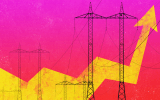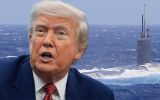


US President Donald Trump said he has ordered two nuclear submarines to be positioned near Russia in response to “highly provocative” threats from former Russian President Dmitry Medvedev.
Trump said the submarines were being deployed “just in case these foolish and inflammatory statements are more than just that”.
“Words are very important, and can often lead to unintended consequences, I hope this will not be one of those instances,” Trump posted to Truth Social on Saturday (AEST).
The souring relations between the US and Russia comes after Trump and Medvedev, who is deputy chairman of Russia’s Security Council, have been trading taunts in recent days.
Medvedev responded to the deadline by warning that “each new ultimatum is a threat and a step towards war. Not between Russia and Ukraine, but with his own country”.
Moscow, which has set out its own terms for peace in Ukraine, has shown no sign that it will comply with Trump’s deadline.
Medvedev on Monday accused Trump of engaging in a “game of ultimatums” and reminded him that Russia possessed Soviet-era nuclear strike capabilities of last resort after Trump told Medvedev to “watch his words.”
Medvedev has emerged as one of the Kremlin’s most outspoken anti-Western hawks since Russia sent tens of thousands of troops into Ukraine in 2022.
Kremlin critics deride him as an irresponsible loose cannon, though some Western diplomats say his statements illustrate the thinking in senior Kremlin policy-making circles.
Earlier on Friday, Russian President Vladimir Putin said that Moscow hoped for more peace talks with Ukraine but that the momentum of the war was in its favour, signalling no shift in his stance despite Washington’s threats..
Putin, without referring to the Trump deadline, said three sessions of peace talks with Ukraine had yielded some positive results, and Russia was expecting negotiations to continue.
“As for any disappointments on the part of anyone, all disappointments arise from inflated expectations. This is a well-known general rule,” he said.
“But in order to approach the issue peacefully, it is necessary to conduct detailed conversations. And not in public, but this must be done calmly, in the quiet of the negotiation process.”
He said Russian troops were attacking Ukraine along the entire front line and that the momentum was in their favour, citing the announcement by his Defence Ministry on Thursday that Moscow’s forces had captured the Ukrainian town of Chasiv Yar after a 16-month battle.
Ukraine denied that Chasiv Yar is under full Russian control.
Ukraine for months has been urging an immediate ceasefire but Russia says it wants a final and durable settlement, not a pause. Since the peace talks began in Istanbul in May, it has conducted some of its heaviest air strikes of the war, especially on the capital Kyiv.
The Ukrainian government has said the Russian negotiators do not have the mandate to take significant decisions and President Volodymyr Zelenskiy has called on Putin to meet him for talks.
“We understand who makes the decisions in Russia and who must end this war. The whole world understands this too,” Zelenskiy said on Friday on X, reiterating his call for direct talks between him and Putin.
“The United States has proposed this. Ukraine has supported it. What is needed is Russia’s readiness.”
Russia says a leaders’ meeting could only take place to set the seal on agreements reached by negotiators.
Ukraine and its European allies have frequently said they do not believe Putin is really interested in peace and have accused him of stalling, which the Kremlin denies.
-with AAP










